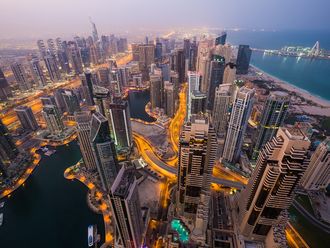Kuala Lumpur/Singapore/Manila/Bangkok/ Jakarta: Tech is so 2017. With at least $323 billion (Dh1.2 trillion) in infrastructure spending in the pipeline in Southeast Asia and potentially more expected over the next few years, 2018 could well shape up as the year of builders’ stocks from Indonesia to the Philippines that have been the laggards in a broader market rally this year.
Governments are boosting spending on everything from airports to high-speed rails and ports to increase connectivity and boost economic growth in what promises to be a boon for the region’s construction companies. In one of the more ambitious programs in the region, Philippine President Rodrigo Duterte has earmarked an unprecedented $180 billion for infrastructure to keep driving one of the world’s best-performing economies over coming years. Malaysia and Thailand are also ramping up allocations to public works ahead of general elections in 2018.
“Infrastructure has been under invested whether it’s clear water, clean air, energy, roads, ports, railways, education, health care — so there are tons of opportunities,” said Ashish Goyal, head of emerging markets equities at NN Investment Partners (S) Ltd., which manages $288 billion in assets. The firm owns stakes in Indonesian construction stocks, he said, adding that investors should watch for the pace of execution in the various countries.
UBS Group AG expects “changes in government policy and delivery on infrastructure” to be among the region’s biggest themes for 2018 as growth in global trade fades, analysts including Ian Gisbourne wrote in a report dated Nov. 28.
Construction stocks on the MSCI Asean Index have risen an average of about 7.4 per cent this year in dollar terms, about one-third the gain of the overall gauge, which is set for its best performance in seven years. Technology shares have provided the biggest boost to the Southeast Asian index this year as global demand for electronics returned.
Construction stocks
Some builders are already rallying in anticipation of the rewards they will reap from the spike in infrastructure outlays. Indonesian cement supplier PT Indocement Tunggal Prakarsa soared as much as 54 per cent earlier this year as investors expect it to benefit from a surge in demand as the nation builds toll roads, ports and power plants. Manila-based EEI Corp has surged 73 per cent, leading a rally in Philippine construction stocks, as it begins work on the nation’s $1.6 billion, 44 kilometre mass-railway project.
Infrastructure development and more Chinese investments into the Philippines could support stocks with net asset value of the nation’s developers expanding by as much as 12 per cent over the next three years, writes Goldman Sachs Group Inc. analysts including Paul Lian in a report dated Dec. 7.
Companies that provide services for construction projects, such as improving management efficiency or sustainability, may also capitalise on the spending boom on public works, Felix Lam, a portfolio manager at BNP Paribas SA’s asset management arm, said by phone.
Even so, the Southeast Asian market as a whole might continue to underperform, compared to “its larger, more liquid and faster growing North Asia and India counterparts,” Goldman Sachs Group Inc analysts including Timothy Moe wrote in a November report. And Credit Suisse Group AG has maintained its underweight rating on the region for 2018.
Still, Morgan Stanley sees investor attention back on the Asean region as markets are expected to give returns of as much as 10 per cent next year, more than three times what’s seen for emerging markets.











